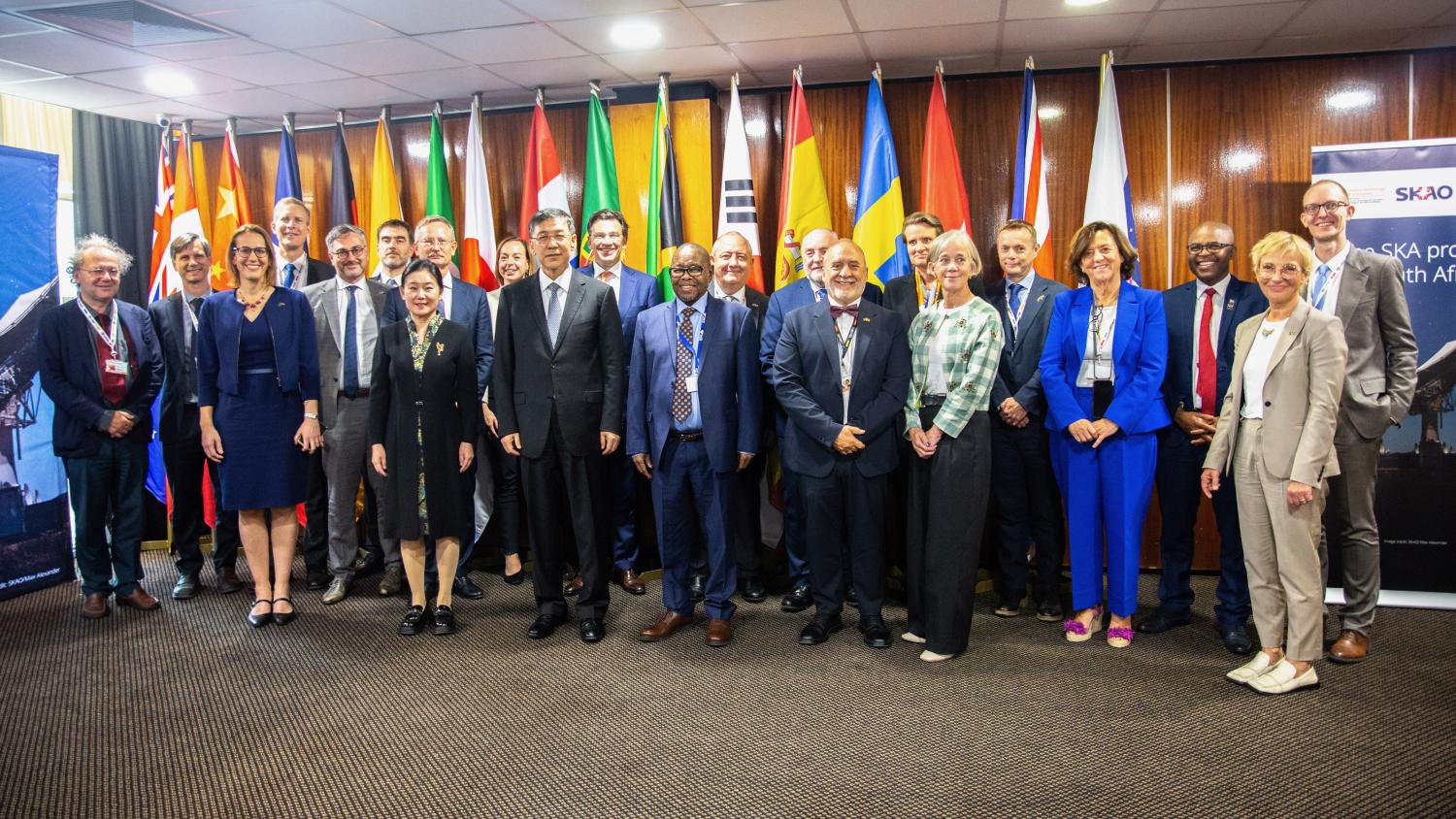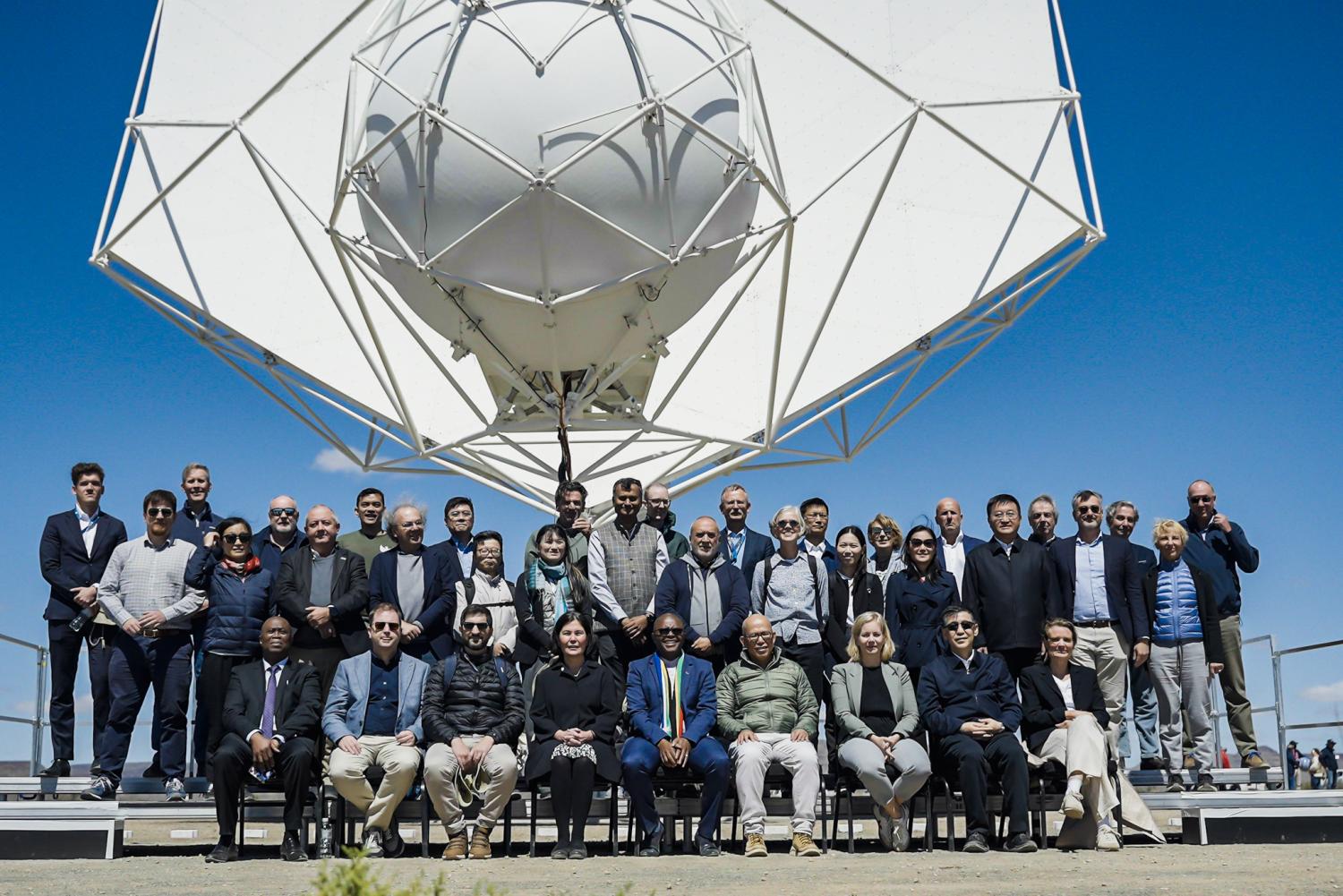Media release: SKA Observatory’s impact highlighted to G20 during week of engagement in South Africa
Wednesday 24 September, Cape Town, South Africa - For the first time the SKA Observatory (SKAO) was invited to participate in a series of G20-related events on the occasion of South Africa’s presidency of the prestigious international forum.
The G20 brings together 19 of the world’s biggest economies as well as the European Union and African Union to discuss economic, development, and social issues. Together, the nations represent 85% of the world’s income, three quarters of international trade, and over half of the world’s population.
Addressing the G20
On Tuesday, SKAO Director-General Prof. Philip Diamond was invited to address the G20 Research and Innovation Ministerial Meeting in Pretoria, the first opportunity for the observatory to highlight both its science and socio-economic impact directly to the Science Ministers of each country, over half of which are taking part in the international organisation. In his speech, Prof. Diamond highlighted the benefits radio astronomy has brought to society - including the awarding of three Nobel Prizes and the development of Wi-Fi - and the role the SKA Observatory is playing in helping to address societal challenges.
“With its 16 participating countries spread across five continents, the SKA Observatory is truly testament to the power of science to have a positive impact,” said SKAO Director-General Prof. Philip Diamond.
The observatory is responsible for building and operating two of the world’s largest radio telescopes, one in South Africa, and the other in Australia, and has its headquarters in the UK.
“In building these two giant, complex cutting-edge machines, this unique global collaboration of nations is also tackling some of society’s biggest challenges,” he added, “like providing decent work, economic growth and quality education, driving innovation, embracing cleaner energy, preserving Indigenous culture and heritage, protecting life on land as well as dark and quiet skies, and striving for a truly diverse workforce, all themes that feature prominently on the G20 agenda.”
A first SKAO Ministerial Council
Later that day, SKAO member states and observers held their first ministerial-level council meeting, where commitment to the observatory as a tool to advance scientific knowledge, foster international cooperation, and drive socio-economic impact was reaffirmed.
The meeting was an opportunity to brief the ministers and representatives on the current status of the project, as well as its impact.
Participating countries are already benefiting from close to 900 million euros in industrial contracts allocated so far, as well as the development of a global research and computing ecosystem around the project.

G20 representatives visit the South African SKA site
On Wednesday, a high-level visit to the South African SKA site in the Northern Cape took place, co-organised by the SKAO, the South African Department of Science, Technology, and Innovation (DSTI), and the South African Radio Astronomy Observatory (SARAO).
Delegations from 26 countries were welcomed on site by DSTI, the SKAO, the National Research Foundation and SARAO in front of South African and international media.
The visit offered a unique opportunity to highlight to representatives of the world’s largest economies how investment in radio astronomy and the SKA Observatory are bringing tangible benefits for society at a time of increased competition and challenges.
“Astronomy has been a strategic priority for South Africa, and the SKA project embodies this vision. It’s more than a scientific endeavour, it’s a driver for socio economic transformation, and a catalyst for developing the next generation of scientists, innovators, and engineers,” said Dr Mlungisi Cele, Director-General of DSTI.
Visitors interacted with beneficiaries of various support programmes funded by SARAO as well as international partners, from local school children taking part in international robotics competitions, newly trained night sky guides to support a nascent astronomy tourism industry and rangers to help manage the Meerkat National Park, as well as established and aspiring artists contributing to the SKAO’s Cosmic Echoes astronomy art exhibition that will soon travel internationally.
The event also highlighted the work of the International Astronomical Union in support of the United Nations’ sustainable development goals, from projects that leverage astronomy to support development in underserved communities, to advocating for the protection of dark and quiet skies for society in the face of increased numbers of satellites in low Earth orbit.
Delegations also had the opportunity to see up close a variety of key telescope hardware being manufactured across SKAO member countries.
The SKAO is making excellent progress constructing the 197-dish SKA-Mid, located in South Africa and the 130,000-antenna SKA-Low, in Australia. Both telescopes have recently ‘opened their eyes’ on the Universe as the systems are being slowly brought into operation, with five dishes now assembled on the site in South Africa, alongside the 64 existing MeerKAT dishes and the 14 new MeerKAT Extension dishes provided by Germany and Italy; across in Australia 12,000 antennas have now been deployed.
At its core, the construction of the SKA telescopes is driven by ambitious science goals that will fundamentally alter our current understanding of the Universe over the coming decades, positioning the SKAO as one of the world’s premier international research infrastructures of the 21st century.

Additional information
- Notes from the Chair issued following the SKAO Ministerial Meeting [pdf document]
Media
William Garnier
+44 781 4908 932
william.garnier@skao.int
Cassandra Cavallaro
+44 738 4511 285
cassandra.cavallaro@skao.int
You’ll find high resolution images, simulations of SKA-Low's future capability, and other video material in our media kit.
About the SKAO
The SKAO is an intergovernmental organisation composed of Member States and partner organisations from five continents, headquartered in the UK. Its mission is to build and operate cutting-edge radio telescopes to transform our understanding of the Universe and deliver benefits to society through global collaboration and innovation.
Its two telescopes, under construction in Australia and South Africa, will be the two most advanced radio telescopes on Earth. Together with other state-of-the-art research facilities, the SKAO’s telescopes will explore the unknown frontiers of science and deepen our understanding of key processes, including the formation and evolution of galaxies, fundamental physics in extreme environments and the origins of life.
Through the development of innovative technologies and its contribution to addressing societal challenges, the SKAO will play its part to address the United Nations’ Sustainable Development Goals and deliver significant benefits across its membership and beyond. The SKAO recognises and acknowledges the Indigenous peoples and cultures that have traditionally lived on the lands on which the SKAO facilities are located.




